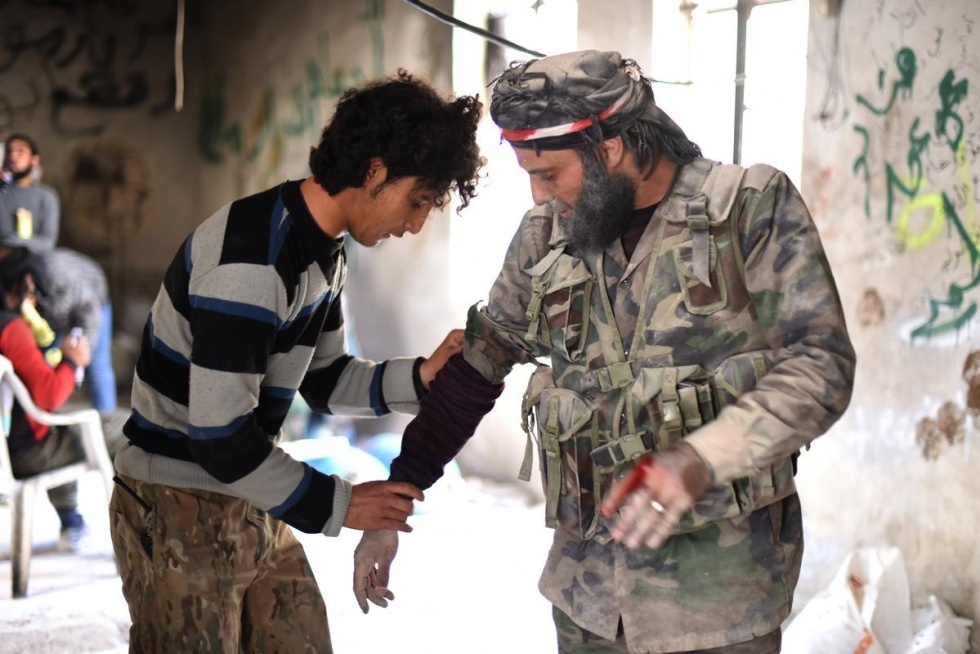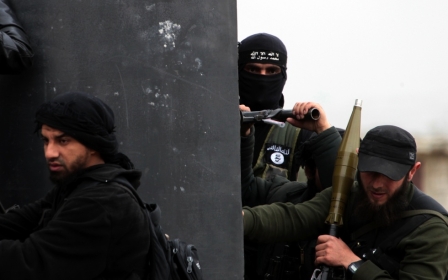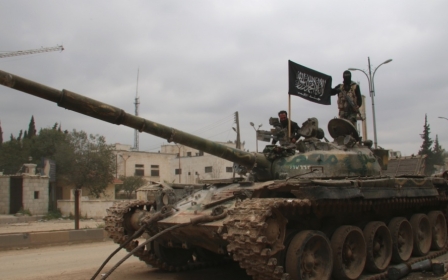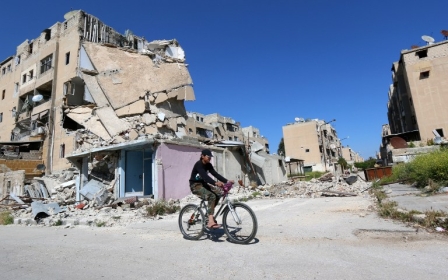ANALYSIS: Nusra Front cements its place in Syria

Al-Qaeda’s affiliate in Syria, the Nusra Front, has long been a central player in Syria’s civil war. But while the group may get less media coverage than the Islamic State (IS) or the Syrian government forces led by President Bashar al-Assad, recent gains have prompted some analysts to predict that the group will outlast both of these rival factions, or at the very least cement its role in the region for years to come.
Steady gains
The al-Nusra Front has been busy making steady gains in northern and southern Syria, consolidating ground support and controlling more and more territory.
Of particular significance was the group’s conquest of Idlib last month. The city was taken by a Nusra-led coalition of fighters from the Jund al-Aqsa, Jaish al-Sunna, Liwa al-Haqq, Ajnad al-Sham and Faynad al-Sha brigades. Together, they managed to wrest control of the city from government forces after months of fierce fighting.
While also battling the Assad government forces, the Nusra-led coalition was able to drive out other rebel opponents, fighting for Hazm Movement, a so-called moderate opposition faction. This came after the new Nusra-led coalition managed to rout another moderate coalition, the Syrian Revolutionary Front, in the province in November last year. Last week, the Nusra-led rebel coalition managed to extend these gains further, taking the city of Jisr al-Shugour, also in Idlib province, from government forces.
The victory saw Nusra and its new allies secure an important win. Not only do they now control most of Idlib, which stretches to the Turkish border, but they also have edged closer to Assad’s Alawite heartland of Latakia province.
The string of advances have helped to demonstrate Nusra’s military prowess as well as its ability to absorb other Islamist brigades, with fresh waves of recruits reportedly now trying to join Nusra.
“Clearly the moment that the rebels demonstrate coordination and good planning … they achieve these sorts of results,” said Yezid Sayigh, a senior associate at the Carnegie Middle East Centre in Beirut.
“Nusra have always demonstrated superior planning and battle management,” he said, while adding that the military success of the rebels in Idlib “was entirely due to their willingness to work with Nusra, who have been the backbone in all of this.”
IS vs Nusra
Nusra has long been seen as one of the best-organised and armed factions in the bloody civil war now in its fifth year. However, Islamic State (IS) emerged as a rival in April 2013 when the group split from its parent organisation al-Qaeda.
Since then, with IS consolidating control in the east of Syria and along the Iraqi border, Nusra has worked to cement territory and build up a strong support base. This stretched through the central eastern corridor of the country in Idlib, extends down to the countryside of Homs and Hama, and goes all the way to the southern Deraa province on the Jordanian and Israeli borders, including the Syrian Golan Heights.
IS is still in control of the oil-rich regions spanning the Iraqi border, but Nusra, with Idlib as its headquarters, controls a strategically crucial corridor of territory that links Syria from north to south.
While Nusra and IS share the common goal of establishing an emirate, interviews with fighters, analysts and Syrian nationals all suggest that thanks to other ideological and practical differences, Nusra harbours an edge over their rivals.
Unlike IS, Nusra counts a greater number of Syrian, rather than foreign fighters, among its ranks. This has given Nusra a strategic advantage, allowing them to shore up local support among civilian and rebel populations.
In Homs and elsewhere, the Nusra Front has been adept at securing bread and other supplies, and at implementing greater administrative services, especially in areas targeted by government forces.
“Nusra has a track record of paying attention to providing basic services, to administration and governance from very early on,” said Sayigh.
This, and the fact that Nusra has positioned itself as the chief adversary of Assad, has resulted in a degree of approval among civilian populations and rebel groups alike.
Over the years, Middle East Eye has heard multiple complaints among civilians in Homs, Idlib and Aleppo against the Western-backed rebels of the Free Syrian Army, who they accuse of corruption.
As one opposition media activist from Idlib, Juma al-Qassem described it: “Nusra are, militarily speaking, the best in the middle. They are the best between the regime, IS, and the dissolved and corrupt FSA.”
Sayigh also described the group as “fundamentally a Syrian organisation, with Syrian interests at heart … at least that’s the perception among other rebel groups”.
While IS has adopted a top-down approach to the establishment of the caliphate, announcing its existence and suppressing resistance thereafter, the Nusra Front has adopted a bottom-up approach.
According to commentators, Nusra has so far been highly decentralised, which has helped it develop a more pragmatic and flexible approach that has seen the group apply leniency in some areas, but enforce their ideology more forcefully in areas that are firmly under their control.
Whereas IS has adopted its own harsh interpretation of Sharia punishment (hudud), including executions and hand cuttings, from its inception, the Nusra Front has adopted a more lenient approach, following the Islamic principle of no hudud during times of war. This has earned it a reputation for greater moderation and support among Syria’s more moderate Muslim population.
Pinnacle or point of no return?
Whether this compromise can continue remains to be seen. According to Sayigh, as Nusra gains more territory, particularly in urban centres, the group and its new coalition will be faced with the challenges of applying a consistent model of Islamic governance to variant populations.
In Idlib, billboards advertising Islamic edicts now line the streets, and there are increasing reports of harsher punishments under Sharia courts, including executions and hand amputations. In one case, a woman was shot in Idlib, apparently for adultery. Forced conversions of the minority Druze population in Idlib province have also been reported, as have crucifixions.
“They’ve [also] implemented hudud punishments elsewhere in areas where they gained monopolies on Sharia committees,” said Aymenn al-Tamimi, a fellow at the Middle East Forum focusing on militant groups.
“Even if Nusra has a guiding principle of no hudud punishments in times of war, it does not mean it will be followed everywhere. Bear in mind there is still no officially declared emirate yet, but this is the intention and the de facto emerging situation in Idlib province.”
In order to secure its standing, it’s likely that Nusra will have to come head-to-head with IS at some point, although with IS tied up in confrontations against western, Shiite and Kurdish-backed forces in eastern Syria and in Iraq, analysts believe that the two groups will avoid direct confrontation in the short-term.
Nusra could also benefit from US airstrikes against IS. The US listed the Nusra Front a terrorist organisation in December 2012, long before the emergence of IS, but since last year the US-led intervention in Syria and Iraq has largely focused on the aim of degrading and “ultimately destroying” IS. While coalition airstrikes have also targeted Nusra positions, the group is less of a priority for the US-led campaign.
Should IS be significantly dented by the western-backed campaign, or encounter serious resistance from local populations fed up with its brutal model of administration, Nusra looks best placed to fill the vacuum in the north, central and eastern parts of Syria.
Nusra already dominates in the southern regions of Syria bordering Jordan and Israel along the Golan Heights, where IS have recently begun to make a small but concerted push from the southern suburbs of Damascus.
Nusra has even shown itself willing to work with the international community in that region, last year working with Qatar in negotiations to release 45 Fijian UN peacekeepers taken hostage in the Golan in September.
Inconsistencies like these illustrate that Nusra is not entirely cohesive and that there are significant differences in ideology between those in the north and south of the country. Rumours also persist that a split has emerged between factions of the front over the long-term benefits of its alignment with al-Qaeda.
However, Carnegie’s Sayigh believes that as long as there is conflict in Syria, Nusra will survive. He speculates, though, that in case of full government breakdown, Nusra will struggle to adapt its ideological model to accommodate the varied social and military landscape in Syria if it chooses to pursue a political course.
“The moment we talk about urban areas, Nusra will find it doesn’t have an automatic base,” he said. “Should Nusra decide to embark on a political plan within a pluralistic system, its allegiance with al-Qaeda could prove problematic,” he added.
In the long-term, Qassem believes the Syrian people’s rejection of IS will push the opposition to embrace Nusra. “The rejection of IS [among Syrians] is much bigger than Nusra,” he said.
And with any possible umbrella deal likely to include Islamist representatives, Nusra, better armed, funded and organised, would be best positioned to fill that role.
New MEE newsletter: Jerusalem Dispatch
Sign up to get the latest insights and analysis on Israel-Palestine, alongside Turkey Unpacked and other MEE newsletters
Middle East Eye delivers independent and unrivalled coverage and analysis of the Middle East, North Africa and beyond. To learn more about republishing this content and the associated fees, please fill out this form. More about MEE can be found here.




